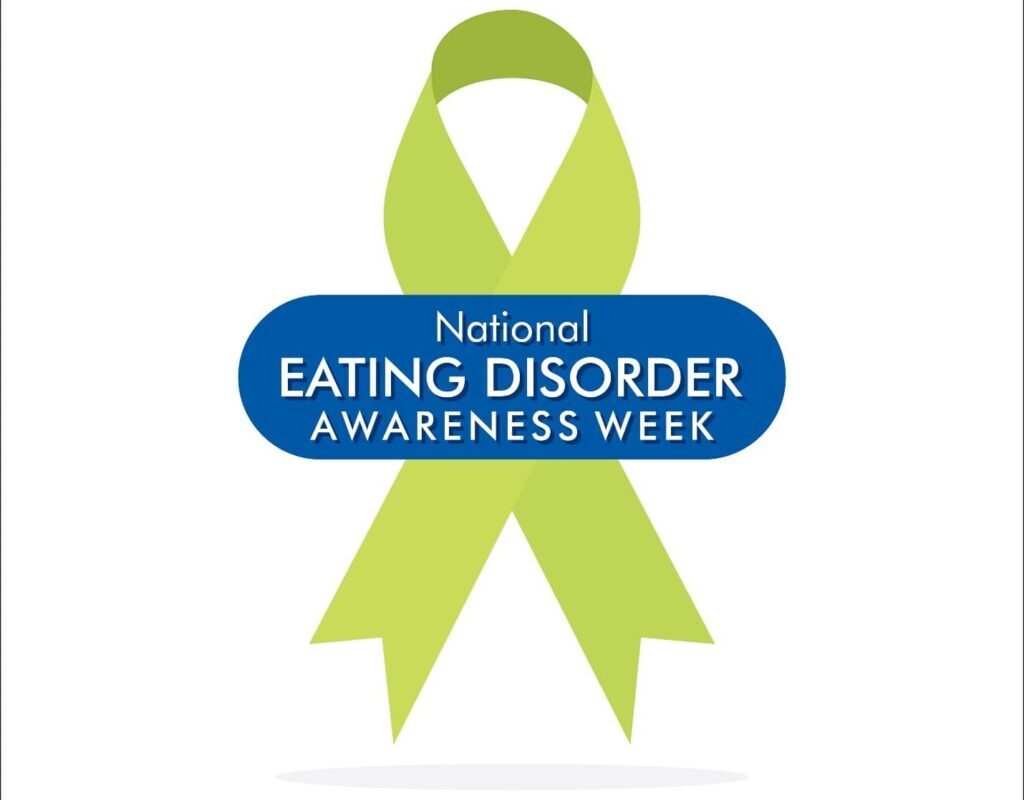National Eating Disorders Week is from February 28 to March 7. Eating Disorders involve the restriction or overindulgent on the intake of food. Many people around the world suffer from an eating disorder, including myself. However, no one, outside of the patients, understands how severe these disorders are. This is the reason why no one asks for help because nobody will take them seriously, which is what happened in my case. Ever since I have been researching about Eating Disorders, I find that I am not alone, and no one else should feel alone either.
Anorexia Nervosa:
Anorexia Nervosa is a serious, potentially life-threatening eating disorder characterized by self-starvation and excessive weight loss.
Symptoms:
- Food restriction leading to significant low body weight in the context of age, sex, development, and physical health
- Intense fear of weight gain/becoming fat
- Persistent behavior interfering with weight gain despite low body weight, such as fasting or excessive exercise
- Disturbed experience of one’s body weight/shape, influenced by self-evaluation or persistent lack of recognizing the seriousness of current low body weight
- Restricting behavior/binge eating and purging behaviors
Medical Complications and Associated Features:
- Signs of depression, such as depressed mood, social withdrawal, irritability, insomnia, and diminished interest in sex
- Obsessive-compulsive features, both related and unrelated to food
- Elevated suicide risk
- Impaired cognitive functioning
- Compromised height and stature
- Low body weight
- Delayed puberty, lack of development
- Hormonal imbalance
- Amenorrhea (menstrual irregularity)
- Gastrointestinal complications such as stomach aches, bloating, constipation, and acid reflux
- Vital sign disturbances, such as dangerously low blood pressure
- Loss of and/or weakened heart muscle
- Bradycardia (abnormally slow heart rate/Tachycardia (abnormally elevated heart rate)
- Heart palpitations and chest pain
- Heart failure
- Edema
Bulimia Nervosa:
Bulimia Nervosa, also known as binging and purging, is a serious, life-threatening eating disorder characterized by a cycle of binging followed by compensatory behaviors, such as purging, designed to undo or compensate for the effects of binging.
Symptoms:
- Regular binging behavior, or intake of large amounts of food accompanied by a sense of loss of control overeating behavior
- Regular purging behavior or recurrent use of inappropriate compensatory behaviors to prevent weight gain
- Cycles of binging and purging occurring at least once a week
- Disturbed experiences of one’s body weight/shape, potentially influenced by self-evaluation
- Maybe in normal weight/overweight range for BMI
Medical Complications and Associated Features:
- Elevated suicide risk
- Impaired cognitive function
- Cycles of binging and purging occurring at least once a week
- Diminished gag reflex and difficulty swallowing
- Esophageal tears
- Gastrointestinal complications such as constipation, loss of bowel function, GI bleeding, acid reflux, gastric rupture, and rectal prolapse
- Amenorrhea (menstrual irregularity)
- Infertility
- Premature and/or low-weight births
- Dental complications such as cavities, extreme tooth sensitivity and enamel loss, and bleeding gums
- Callused/scarred fingers
- Ophthalmologic complications such as ruptured blood vessels or retinal detachment
- Chronic dehydration and electrolyte imbalance
- Pancreatitis
- Cardiac arrhythmias (abnormal heart rate)
Binging Eating Disorder (BED):
Binging Eating Disorder, also known as binging, is a serious eating disorder characterized by recurrent binging without use of inappropriate compensatory weight control behaviors.
Symptoms:
- Regular binging periods
- Binging episodes with eating much more rapidly than usual, eating until feeling uncomfortably full, eating abundant amounts of food when not feeling physically hungry, eating alone because of feeling embarrassed by how much one is eating, or feeling disgusted with oneself, depressed, or very guilty after each episode
- Marked distress regarding binging behaviors
- Binging episodes occurring at least once a week
- Binging not associated with recurrent use of inappropriate behaviors presented in bulimia
Medical Complications and Associated Features:
- Impaired health-related quality of life and life satisfaction
- Weight gain/obesity
- High blood pressure
- High cholesterol levels
- Heart disease
- Type II Diabetes Mellitus
- Gallbladder Disease
Avoidant or Restrictive Food Intake Disorder (ARFID):
Avoidant or Restrictive Food Intake Disorder is a serious eating disorder characterized by eating and feeding disturbances resulting in significant weight loss and other medical complications.
Symptoms:
- Eating and feeding disturbances, such as an apparent lack of interest in eating or food, avoiding food based on its sensory characteristics, or concern about aversive consequences of eating, not better explained by the lack of available food or an associated culturally sanctioned practice
- Persistent failure to meet appropriate nutritional and energy needs
- Significant weight loss, significant nutritional deficiency, dependence on enteral feed or oral supplements, and/or marked interference with psychosocial functioning
- Lack of disturbed perception and experience of one’s own body weight/shape
- Behavior described as restrictive, selective, choosy, or perseverant eating
- Presence of a conditioned response associated with food intake
Medical Complications and Associated Features:
- Weight loss or faltering growth
- Generalized emotional difficulties, sometimes referred to as “food avoidance emotional disorder”
- Mirroring of medical complications and associated features of anorexia
Other Specified Feeding and Eating Disorder (OSFED):
The majority of those with eating disorders do not fall within the guidelines for anorexia, bulimia, and binging disorder and are classified as OSFED. To be diagnosed with an OSFED, a person must present with a feeding and eating behaviors that cause clinically significant distress and impairment in areas of functioning, but don’t meet the full criteria for any other eating disorders.
A diagnosis might be allocated that specifies a specific reason why the presentation doesn’t meet the specifics of another eating disorder. The following are further examples of OSFED:
- Atypical Anorexia Nervosa: All criteria are met, except despite significant weight loss, the individual’s weight is within/above the normal range.
- BED (of low frequency and/or limited duration): All criteria are met, except at a lower frequency and/or for less than 3 months.
- Bulimia Nervosa (of a low frequency and/or limited duration): All criteria are met, except at a lower frequency and/or for less than 3 months.
- Purging Disorder: Recurrent purging behavior to influence weight/shape in the absence of binging.
- Night Eating Syndrome: Recurrent episodes of night eating. Eating after awakening from sleep, or by excessive food consumption after the evening meal. There’s an awareness and recall of the eating. The behavior isn’t better explained by environmental influences or social norms. The behavior causes significant distress and impairment and isn’t better explained by another mental health disorder.
Medical Complications and Associated Features:
- Weight loss or faltering growth
- Generalized emotional difficulties
- Mirroring of medical complications and associated features of anorexia
Unspecified Feeding and Eating Disorder (UFED):
This category applies to where behaviors cause clinically significant distress and impairment of functioning, but don’t meet the full criteria of any other FED criteria. This category may be used by clinicians where a clinician chooses not to specify why criteria aren’t met, including presentations where there may be insufficient information to make a more specific diagnosis (e.g., in emergency room settings).
To view what was discussed in full detail, or to find more information about eating disorders, visit https://www.freedeatingdisorders.org/patient-family-support/types-of-eating-disorders/


 by
by 

